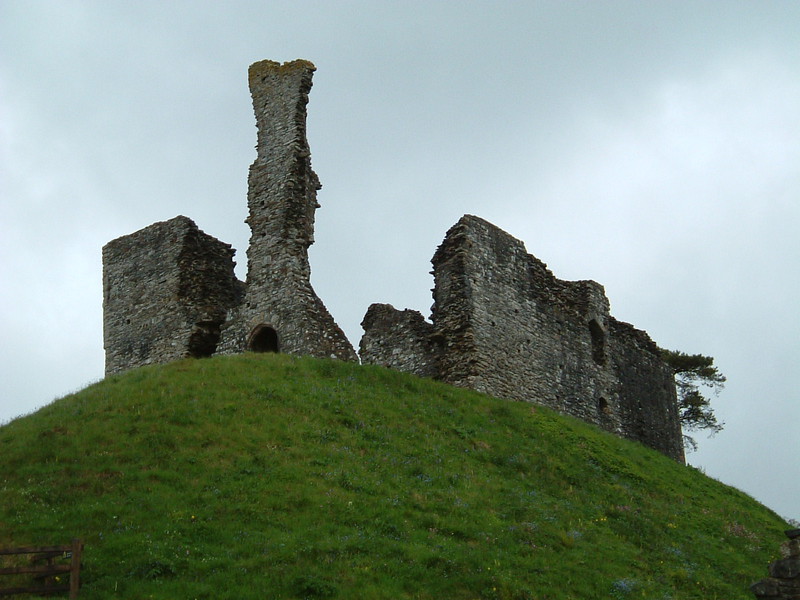
With my right foot showing signs of imminent failure and my tent a useless pile of sodden super-light fabric, I needed to concentrate on keeping my mind happy. When your body and your gear give up the ghost within an hour of each other, there's little else you can do except pander yourself.
Luckily, Okehampton turned out to be a great place in which to break down. Peta's search for a nearby bed came up with the lovely Penare B&B, where everything that is good about British Bed and Breakfast helped soothe the emotional roller-coaster I'd become. Mike and Viv, the couple who host the B&B at Penare, were utterly charming, and from the minute I staggered through the door, looking like something the cat didn't even bother to drag in, I felt right at home. The room was comfortable, the breakfasts would prove to be just what the doctor ordered, and the centre of the metropolis of Okehampton was just downhill from the B&B, an important consideration given the shooting pains in my foot.
'You see the lady who just left?' said Viv, pointing to a woman who was leaving just as I wandered up the drive. 'Well, she was doing the Southwest Coastal Path with a really heavy pack, and she had to give up through injury. She damaged the muscle at the top of her leg, and it's still giving her problems, a month later.'
I sighed with sympathy and felt a great big surge of relief. An hour before I'd been sitting in a campsite, feeling totally alone with my damaged foot and my broken tent pole, and now I was back in civilisation with people who not only understood what I was going through, but some of them had been through it themselves. I can't tell you how much better that made me feel.
Recovery Process
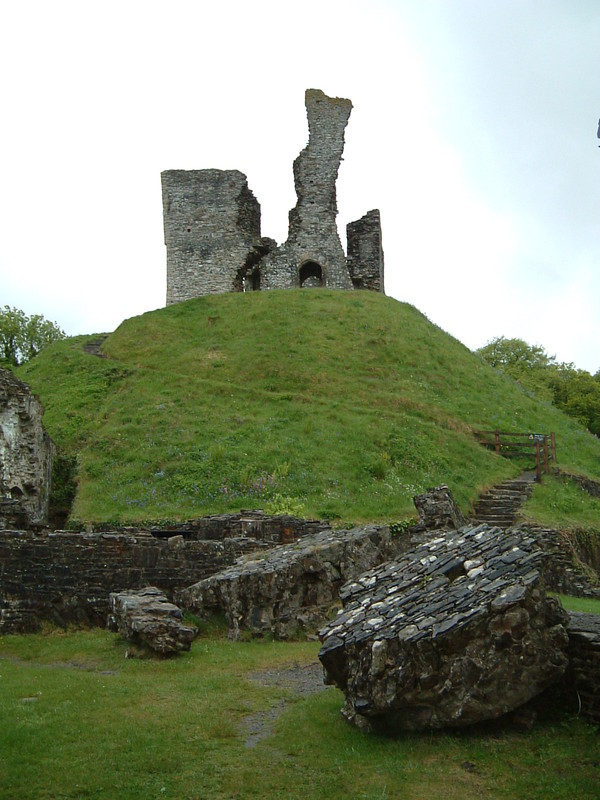
My first priority was to get some food inside me and enjoy a decent night's sleep, and the Plymouth managed to rustle up a perfect meal for me. The pork medallions in mustard and honey sauce lasted about as long as the sautéed potatoes, broccoli and carrots, and to wash it down I sampled a couple of the real ales on offer from the kegs sitting behind the bar. You know you're onto a winner when the beer is served from barrels that have nothing more fancy than a tap on the front, and it seems that CAMRA agrees, as the Plymouth was voted the North Devon CAMRA Pub of the Year for 2002.
The ale, Skinner's Cornish Knocker, helped not only to dull the pain of my aching foot, but also to dull my senses, which were more than a little fraught after the day's setback. A few hours ago I'd still been on track, mentally making plans for the next few stages and looking forward to an eventual improvement in the weather as summer approached with the dwindling mileage to Scotland. Suddenly things were very different: sure, my tent could be fixed, but more pressingly, could I carry it any further? I knew that something would have to change, but for the moment I left the decision until after the Cornish Knocker had done its work. Not surprisingly, I slept like a dead man.
Phone Therapy
Sunday morning awoke to me phoning people for advice. I called Sarah, a physio friend who'd very kindly offered to help me out over the phone should I need advice, and after I'd explained what the problem was and how it had happened, she said it sounded like an inflamed tendon that was being irritated by my boots. The best approach would be threefold: first, get some ice on it to reduce the swelling, because it's the swelling that causes the pain; second, get hold of some chiropody felt and stick it around the affected area, to keep pressure off the tendon; and third, shed as much weight as possible from my backpack, because the lighter the load, the less the chance of irritation. It all made perfect sense, though she was also keen to point out that if it continued to hurt, the only real solution would be to see a professional, in the flesh.
Still, I had enough options to make a plan, and next on the phone was Peta, to whom I whinged and moaned before concluding that I should go through my pack, discard as much as possible (including my tent) and post it back to her in London. She offered to help me find B&Bs for the rest of my trip, and pointed out that even if things still went wrong and I couldn't walk, then at least I'd have tried a different approach. She also reminded me that I'm supposed to be doing this for fun, and if walking with the current pack isn't an option, perhaps walking without it is. It's a good point.
And finally I rang my Mum, because that always helps. And, sure enough, it did.
Big Pack, Little Pack
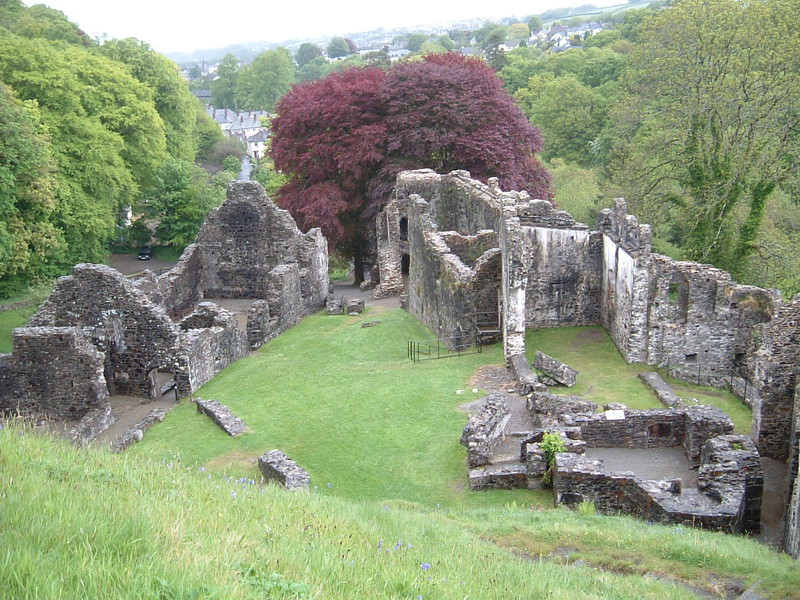
In sorting out my new backpack regime, I was ruthless. I adopted the kind of Buddhist minimalism that I apply to travelling in the Third World – nobody notices if you smell over there, so you can get away with hardly any clothes – and I managed to reduce my weight by about half. The box I put together to send to Peta weighed 7kg, and I managed to dump another 1.5kg by carrying less water and by chucking out some of the more paranoid medicines and toiletries that I figure I can live without (such as athlete's foot cream, hydrocortisone cream, deodorant and so on). My pack, therefore, has now dropped from 17kg to 8.5kg, which is about as light as you can go if you still carry all the wet weather gear you need, the relevant maps and route guides, a computer, minimal water, food and two sets of clothes (one for walking and one for civilisation).
The losses include my defunct tent; my sleeping bag and my inflatable sleeping mat; the maps I've already used; an accommodation guide to B&Bs and hostels; my sandals, some extraneous clothes, and my hand towel; and two of the four 500ml water bottles I've been using as water carriers (with less to carry, there's less sweating going on, I figure). OK, so I can't camp where I like, I'm restricted to one pair of shoes and I don't have the flexibility of having all those dry clothes in case of a good soaking, but because I know I'll be spending every night under a roof, I don't need these luxuries.
After all, I don't actually have a choice if I want to keep walking.
The Second Castle
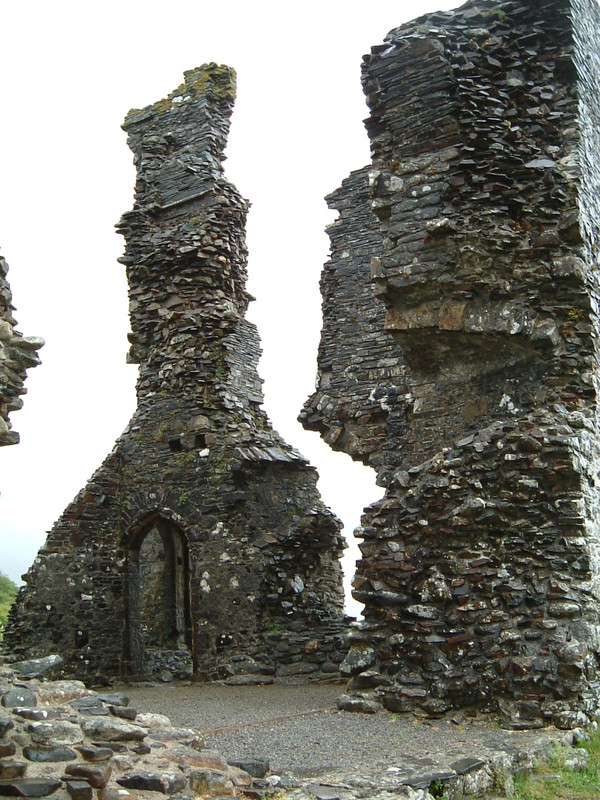
Determined not to let my unscheduled visit to Okehampton turn into the self-pitying wallow that it could easily have become, I decided to keep myself busy. Apart from tackling the planner's wet dream of reorganising my pack for the new challenge ahead, I decided to explore Okehampton properly, as I'd only briefly shot through at lunchtime the day before.
Unfortunately the weather had other ideas, and just to make sure I didn't forget who was the boss, it blustered and blew all day. The odd sunny struggle peppered the downpours, and foolishly falling for Mother Nature's trickery, I left the B&B for Okehampton Castle just in time to get hit by a massive squall as I approached the ancient battlements.
The lady at the English Heritage counter was utterly amazed to see me knocking on the window and asking for a ticket in the torrential rain. Apparently it hadn't been busy – no surprises there – but she cheerily took £2.60 off me and wished me a pleasant visit to the castle, and huddled inside my Gore-Tex jacket, I started up the path to the castle.
Okehampton Castle is quite different to Launceston Castle, and both castles are well worth a visit (especially if you've been walking the Two Castles Trail, which links the two together). Where Launceston's castle consists of a cylindrical keep on top of a perfect cone that dominates the town, Okehampton Castle is built on top of a man-made hill in the middle of a valley some way away from the town centre, and as such it has lovely views up and down the valley, with the town tucked away neatly at one end. But the big difference is in the keep; Okehampton's keep is a rectangular building that has been utterly devastated by the elements, and where Launceston's profile is wonderfully neat and tidy, Okehampton's is almost comically ruined.
From the bottom of the hill, the silhouette of Okehampton's keep is like something out of an enchanted forest, a pile of precariously balanced and tortured stone piles that look like twisted old crones frozen in rock. The scene is dominated by what initially appears to be a fireplace with a meandering chimney sticking up to the sky, the surrounding stonework having worn away long ago; on closer inspection the fireplace turns out to be the main entrance to the keep, and the chimney is just the wall section that happens to be above the entrance, but from below the whole thing looks eerily like a bent witch's finger, quite unlike Launceston's neat and symmetrical beauty.
There are also a lot more ruined buildings around the bottom of Okehampton Castle, and the information boards are good at showing you exactly how things would have looked back in the days of the Normans, when the castle was an important strategic outpost. Unfortunately I spent most of my visit huddling under the roofless shelter of the craggy castle walls, but as with my visit to Launceston Castle, it only added to the atmosphere. Soon enough the rain lessened slightly and other tourists started appearing from the stonework, grim determination etched into their faces as the wind whistled down the valley, but I'd already seen enough, and I could hear the call of the Plymouth from the other side of town.
A Startling Collection
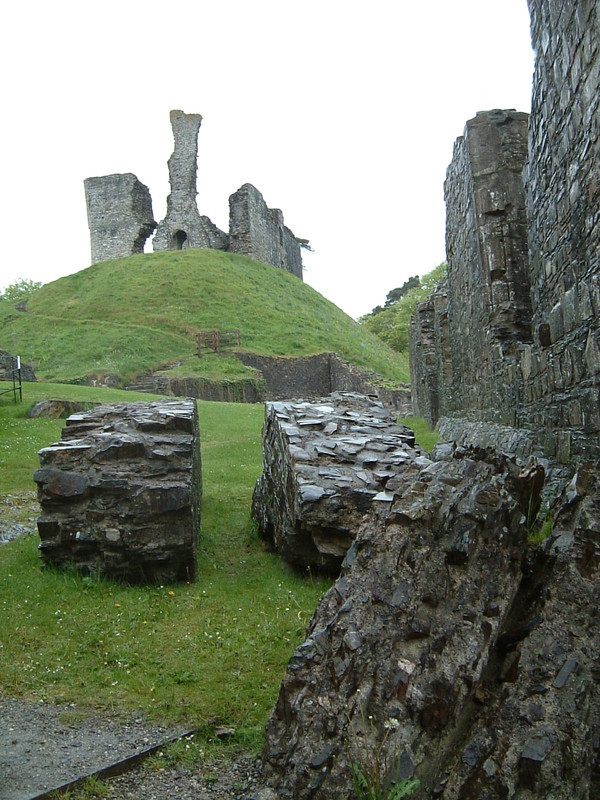
When I travel, my portable computer is a great way to break the ice, especially in places where technology is a complete stranger. Not many people in the developing world have seen a fold-out keyboard and a tiny palmtop computer, so whenever I'd pull it out and start typing, I'd get an audience of people who couldn't quite believe what they were seeing. Amazingly, I got pretty much the same reaction in the Plymouth as I settled in for a Sunday afternoon with the Cornish Knocker crowd.
I sat in the corner, minding my own business and trying to ignore the steam that slowly rose from my hair, but gradually the locals plucked up enough interest to wander over for a look at the amazing fold-up computer. Of course, I oblige whenever this happens; the look on people's faces is priceless when they see a full-size keyboard disappear into a tiny case the size of a hand, and once someone has seen it, they go back to their mates and say, 'Hey, that guy over there's got a computer that folds up into nothing. Go on, go over and have a look.' And sure enough, over they come, politeness personified, and I play them my keyboard concertina to rapturous applause.
Two of the regulars, a couple of young blokes called Adam and AJ, came over to see my keyboard and settled down for a chat. I instantly warmed to them; they were real Okey boys (as the locals call the town), Adam born and bred here, and AJ a Cornishman who'd crossed the border. We pottered through pub conversation and I span them tales of heavy backpacks, inflamed tendons and Cornish Knockers while they told me all about life in Okey. And then, by some bizarre twist of conversation, AJ casually mentioned that he was a collector of swords, daggers and knives.
'Um, swords?' I gulped, even though AJ didn't look like the kind of man who would take a samurai sword to a meeting with his local Member of Parliament (as someone recently did).
'Don't worry, I'm a collector,' he said. 'I don't actually use them.'
And like all collectors who've managed to stray onto the subject that's closest to their hearts, AJ started talking about his collection with obvious passion. He explained about the way blades are beaten into shape, with the metal being hammered into incredibly thin sheets before being folded up and hammered out again and again and again; he described how he bought his swords, sometimes from catalogues and sometimes over the Internet; he talked about his latest acquisition, the Sword of the Valkyries, which had set him back £400, and how he'd been going to spend £700 on the sword from the Lord of the Rings, but they'd sold out.
I was genuinely interested; I muddled my way through the terminology and wondered what the appeal of collecting swords might be, so when AJ offered to show me his collection I jumped at the chance. He only lived a few doors down from the pub, so off we went, and it was only later that it struck me that I'd just agreed to disappear off with two complete strangers I'd met in a pub to go see a collection of lethal weapons. It's not something I'd do in London...
I needn't have worried; AJ was most definitely a collector rather than a weapons nutter, and his swords were indeed impressive. By law any blade over a certain length cannot be sharpened (otherwise you can be arrested for possession of a lethal weapon), but apart from the dullness of the blades, these swords were real. They were heavy, they were made by craftsmen, and they were clearly lethal even without sharp blades; hell, AJ's wooden practice sword could have done considerable damage, but then again, so can an electric iron in the wrong hands.
'And where did you get this one from?' I asked, pointing towards a short dagger in a decorated sheath.
'Oh, my mum brought that one back for me from Turkey,' he said, and my eyes boggled.
'Is that legal?' I asked.
'Yep, it's fine,' said AJ. 'As long as it's not in your hand luggage and is locked in your suitcase, it's no problem.'
'Oh,' I said, amazed.
'Or you can post it back home,' he continued, 'though that's a right hassle. I'm off to Crete next week, and I'm going to bring back a knife with a handle made of shark skin; it's really rough, and grips your palm like glue. You can't twist the knife when you're holding on to it, it's that rough. Lovely piece of work.'
'Wow,' I said, sticking to the monosyllabic responses of a man confronted with a whole new world of weirdness.
'Yeah,' echoed AJ, pulling on his roll-up and gazing at his swords with pride. 'Look at this one,' he said, picking a sheathed samurai sword. 'Lovely sword, but my bloody ex broke it. Look.'
And he pulled off the sheath to reveal a curved sword that was cleanly snapped off at the hilt.
'Bloody hell, how did she do that?' asked Adam.
'With a lot of effort,' said AJ, daggers in his eyes, and with that we went back to the pub for a few more Cornish Knockers and deep and meaningful conversation about AJ's ex-girlfriend, the joys of living in Okehampton, and the Torquay club scene. It was a bizarre end to a good day, and as I headed back to the B&B, I couldn't help thinking that in small towns like this, still waters run fascinatingly deep.